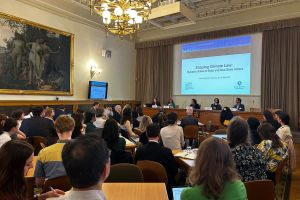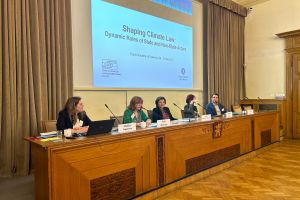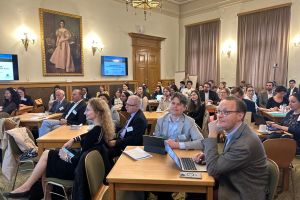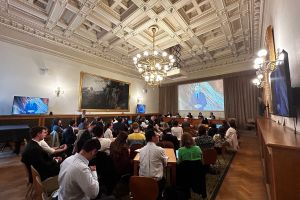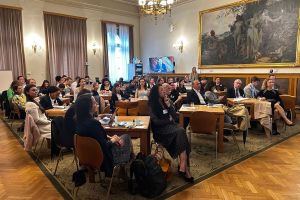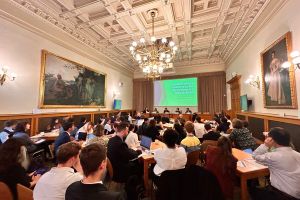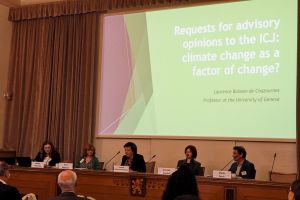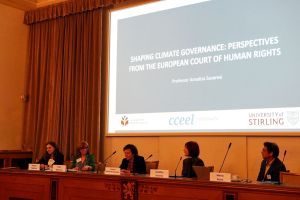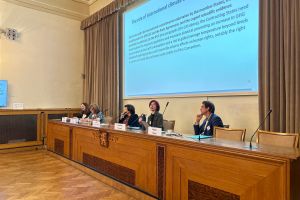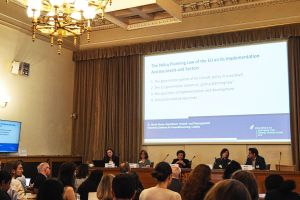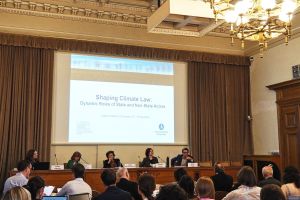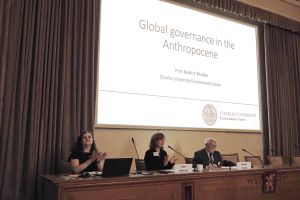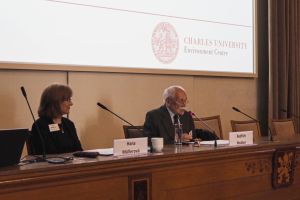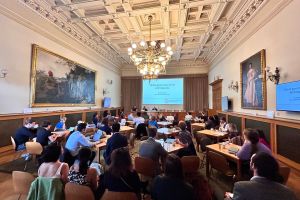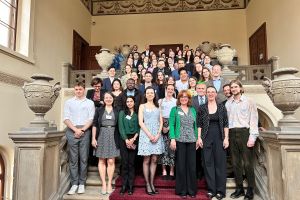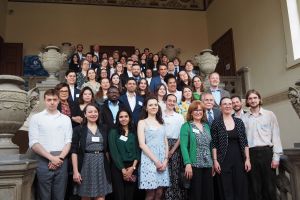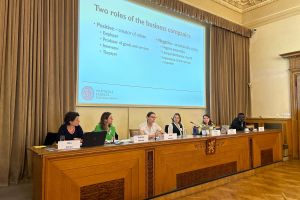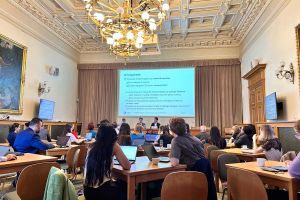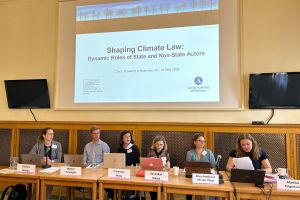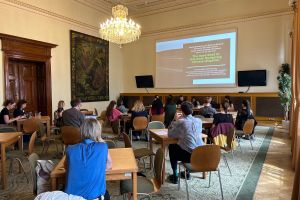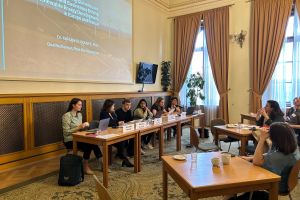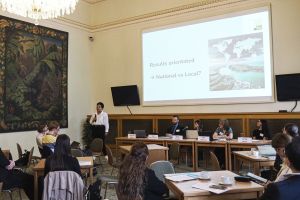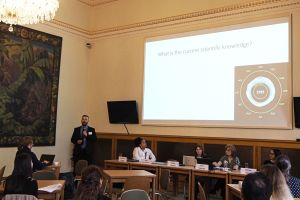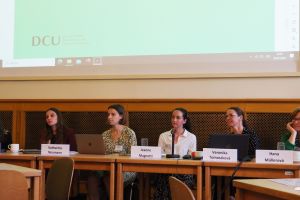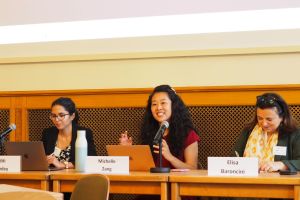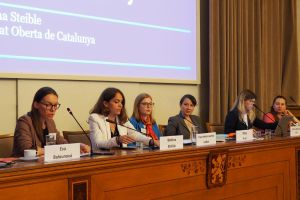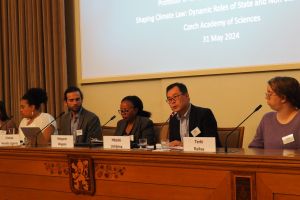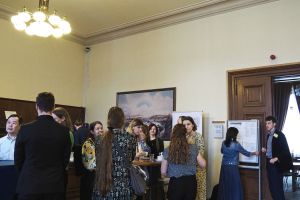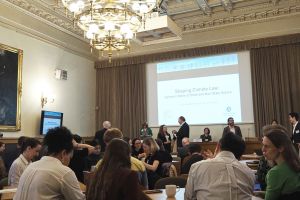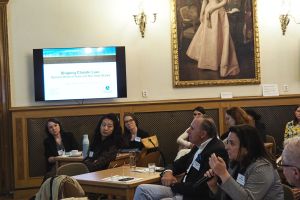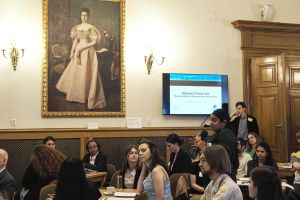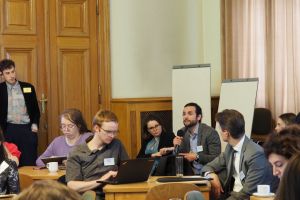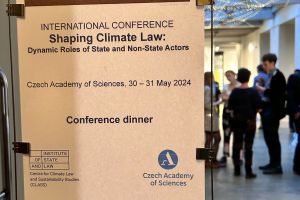International Climate Law Conference 2024
Call for chapter abstracts closed
10 August 2024
Thank you to everyone who sent us their chapter abstracts. We received a lot of interesting abstracts. We will inform you about the result during September/October 2024.
Call for chapter abstracts
10 June 2024
Based on the themes of the conference, we will be working on a collective book. We have prepared a call for abstracts, which is open to all - those who presented at the conference, conference attendees and others interested. You can share this call with your colleagues. The text of the call can be found in a separate pdf file here:
Conference presentations
31 October 2024
Here we post the presentations from the conference upon speakers' permission:
 Matteo Fermeglia: The Show Must Be Green: Hosting Mega-Sporting Events As a Climate Governance Tool
Matteo Fermeglia: The Show Must Be Green: Hosting Mega-Sporting Events As a Climate Governance Tool
 Elif Naz Němec: Navigating the Legal Landscape: The Role of Courts in Shaping Climate Adaptation through Development Permit Litigation
Elif Naz Němec: Navigating the Legal Landscape: The Role of Courts in Shaping Climate Adaptation through Development Permit Litigation
 Heloisa Oliveira: Climate Laws: Testing Inclusiveness and comprehensiveness
Heloisa Oliveira: Climate Laws: Testing Inclusiveness and comprehensiveness
 Terhi Raikas: Environmental NGOs’ climate court cases and human rights in Northern countries
Terhi Raikas: Environmental NGOs’ climate court cases and human rights in Northern countries
 Moritz Reese: The Policy Planning Law of the EU an its Implementation Accross Levels and Sectors
Moritz Reese: The Policy Planning Law of the EU an its Implementation Accross Levels and Sectors
 Oliver Ruppel: The future of the SDGs: A Comparative Constitutional Rescue Plan?
Oliver Ruppel: The future of the SDGs: A Comparative Constitutional Rescue Plan?
 Bettina Steible: Revisiting the Plaumann Criteria in the Face of the Climate Emergency
Bettina Steible: Revisiting the Plaumann Criteria in the Face of the Climate Emergency
 Chiara Treglia: Institutionalising Green Finance without Sacrificing Financial Stability
Chiara Treglia: Institutionalising Green Finance without Sacrificing Financial Stability
 Enéas Xavier de Oliveira: An innovative approach for international environmental law: the critical role played by civil society in tackling climate change
Enéas Xavier de Oliveira: An innovative approach for international environmental law: the critical role played by civil society in tackling climate change
 The conference ‘Shaping Climate Law: Dynamic Roles of State and Non-State Actors’ is over. We thank all speakers and participants for their attendance!
The conference ‘Shaping Climate Law: Dynamic Roles of State and Non-State Actors’ is over. We thank all speakers and participants for their attendance!
6 June 2024
Final version of the conference programme can be downloaded HERE. Short version of the programme (without speakers' bios), is available HERE (both versions last updated 30 May).
Here you can view the photos from the conference:
Photo credit: Eliška Johnová and Veronika Radová
Web archive of the conference:
Prague, 30–31 May 2024REGISTRATIONhas been closed |
We are delighted to announce the international climate law conference
Shaping Climate Law: Dynamic Roles of State and Non-State Actors
that will be held on 30–31 May 2024 in Prague
Conference venue: Czech Academy of Sciences, main building, Narodní 1009/3, Prague 1
The conference is organised by the Centre for Climate Law and Sustainability Studies (CLASS), Institute of State and Law of the Czech Academy of Sciences.
About the conference
As the global response to climate change continues to evolve, so too do the roles of diverse actors in shaping climate law. This conference aims to explore how different stakeholders – ranging from governments, regions, cities, businesses, industry associations, courts, civil society, activists, NGOs and climate assemblies, energy communities, to individuals as voters and consumers, – are contributing to the formulation, implementation and enforcement of climate-related regulations.
The key actors are states, as international lawmakers and as creators and implementers of climate policies and measures. In addition, the importance of non-state actors in climate policy and law is indisputable. They play various roles in all stages, in the „before“ (setting the agenda), „during” (participation in negotiations and drafting), and „after“ (in enforcement and monitoring). Regions and cities are shaping local responses to climate change. Citizens, civil society and NGOs help to set the level of expectations. The international climate regime itself relies on them by emphasising transparency and cooperation as core principles. International and domestic courts play an increasing role in climate law within the climate litigation. While businesses are primarily objects of regulations and subject to legal actions regarding their climate accountability; they also serve as private rule-setters and drivers of innovation in tackling the climate crisis.
Keynote speakers
It is our honour and great pleasure to share that our invitation as keynote speakers has been accepted by:
Prof. Laurence Boisson De Chazournes, Professor of international law at the University of Geneva Faculty of Law, Director of the LL.M. in International Dispute Settlement (MIDS) and Co-director of the Geneva Center for International Dispute Settlement (CIDS).
Prof. Annalisa Savaresi, Professor at the Center for Climate Change, Energy and Environmental Law, University of Eastern Finland, Professor of Environmental Law, University of Stirling (UK), Director for Europe, Global Network on Human Rights and the Environment.
Dr. Moritz Reese, Deputy Head of the Department for Environmental & Planning Law at the Helmholtz Centre for Environmental Research; Chairperson, EELF; Co-editor, JEEPL; Lecturer in Environmental Law at the law faculty of Free University of Berlin.
Call for abstracts
During this two-day conference, we aim to explore the different roles of actors in climate law, reflecting on their different nature, forms of engagement, stages, and effects. The conference committee invites abstracts by scholars at all academic stages, including PhD students, to share their research findings, ideally those linked to one of the research themes specified below:
-
The Role of States Internationally
This theme will focus on ‘making’, interpreting, and enforcing the international climate regime in the sense of international law development, where the states are the main actors. However, the influence of others is indisputable. Climate ambitions, global inequalities, NDCs or the role of regional organisations can also be addressed.
-
The Role of Governments Domestically
This topic will concentrate on framing and developing climate action nationally; for example how the national climate laws work, how various levels of governance may be involved in climate action, what is the role of cities and regions, or how to ensure a just transition.
-
The Role of Individuals and Civil Society
Here, different forms of civil society involvement in shaping climate law will be explored, from formal engagement in public participation processes or climate assemblies to activism and civil disobedience. Cross-cutting themes on individuals as consumers or voters in relation to law are also welcome, as well as the rights of children, and future generations, and their involvement.
-
The Role of Business
The contributions under this theme are welcome to deal with the business transition to net-zero, including supply chains, the climate dimension of corporate responsibility, the role of climate finance and investment in shaping climate governance and net-zero commitments by diverse actors and their delivery, including carbon offsetting, and businesses’ voluntary and mandatory climate reporting.
-
The Role of Courts
The leading theme of this session will be climate litigation, which is a growing trend in different forms, in different fora, and with different objectives. Any type of climate litigation, brought against any type of actors can be discussed here.
The conference is planned as a face-to-face event. Based on the conference themes, we plan to prepare a common collective volume, for which we will invite the participants to submit chapter abstracts shortly after the conference.
Upon registration (starting in March), we will charge a conference fee, which we will be EUR 150 for regular attendants and EUR 100 for PhD students. Note: In case of cancellation after 19 May and in case of non-appearance, the conference fee will not be refunded. The conference organisers regret that they are not able to arrange or fund participants’ travel or accommodation.
The call for abstracts is closed now. You can download the pdf version of the Call for abstracts here.
The conference is organised by the Centre for Climate Law and Sustainability Studies (CLASS), Institute of State and Law of the Czech Academy of Sciences. It will be co-funded by the Lumina quaeruntur Climate law project conducted at the Institute of State and Law CAS.
The conference committee: Hana Müllerová, Monika Feigerlová and Eva Balounová (CLASS).
Have a question? Contact us at conference@ilaw.cas.cz.

